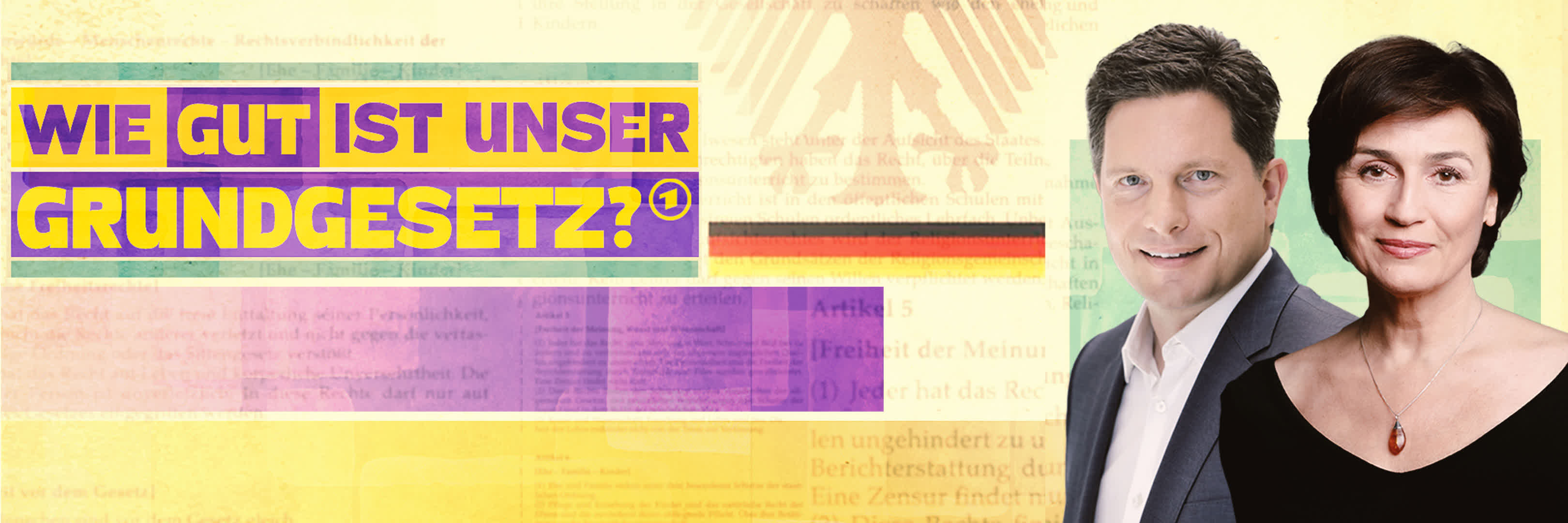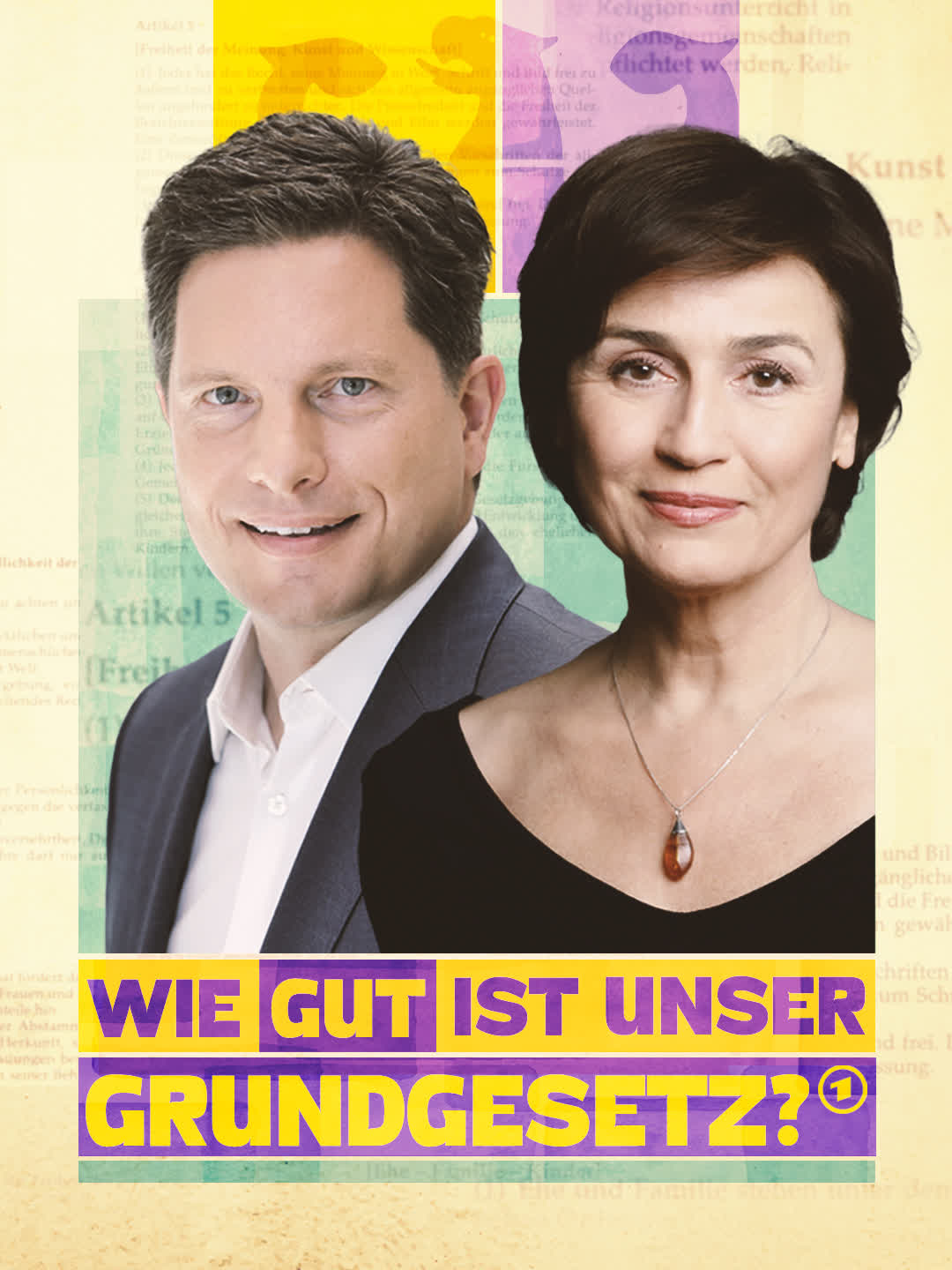Wie gut ist unser Grundgesetz?
Der Dokumentarfilm "Wie gut ist unser Grundgesetz?" untersucht die anhaltende Relevanz und Widerstandsfähigkeit des deutschen Grundgesetzes zu seinem 75-jährigen Jubiläum. Durch Interviews mit Bürgern und Experten wird die Anwendung der Prinzipien des Grundgesetzes in der modernen deutschen Gesellschaft beleuchtet, wobei sowohl Erfolge als auch Verbesserungsbedarf hervorgehoben werden.
Studio Fritz Gnad stellte die Grafiken, Infografikanimationen, Titeldesigns und Key Visuals für den ARD-Dokumentarfilm "Wie gut ist unser Grundgesetz?" von Regisseurin Nina Bauer bereit. Der Film wird von den TV-Moderatoren Sandra Maischberger und Frank Bräutigam präsentiert und wurde von Vincent Productions für das SWR Fernsehen produziert. Der Film wurde Mai 2024 im Ersten ausgestrahlt.
Zentrale Themen im Film:
Meinungsfreiheit im digitalen Zeitalter: Der Film untersucht, ob Menschen in Deutschland sich heute frei fühlen, ihre Meinung zu äußern, besonders im Online-Kontext. Comedian Lukas Staier ("Cossu") spricht über die Herausforderungen der Satire, während Anna-Lena von Hodenberg von HateAid den Einfluss von Online-Hassrede auf die Meinungsäußerung thematisiert. Statistiken zeigen, wie die Öffentlichkeit Einschränkungen der Meinungsfreiheit wahrnimmt.
Wiedervereinigung und das Streben nach Gleichheit: Der Film beleuchtet die Rolle des Grundgesetzes bei der Wiedervereinigung und fragt, ob es Gleichheit zwischen Ost- und Westdeutschen fördert. Jan Josef Liefers teilt seine Erfahrungen aus der Wendezeit, während Joachim Gauck die Entscheidung, das Grundgesetz beizubehalten, und deren Auswirkungen auf die Einheit erläutert.
Grundrechte in Krisenzeiten: Umgang mit der COVID-19-Pandemie: Der Film analysiert die Rolle des Grundgesetzes während der Pandemie und den Schutz grundlegender Rechte. Schüler und Eltern, die gegen Schulschließungen klagten, und Stephan Harbarth, Präsident des Bundesverfassungsgerichts, kommen zu Wort. Der Film zeigt auch öffentliche Meinungen zu den Maßnahmen.
Triage und der Wert des Lebens: Der Film behandelt ethische und rechtliche Fragen der medizinischen Triage während der Pandemie, besonders für Menschen mit Behinderungen. Carola Nacke schildert ihren Kampf für die Gleichbehandlung ihres Sohnes Cornelius und die Bedeutung des Grundgesetzes als Schutz.
Der Kampf um Gleichberechtigung: LGBTQ+-Rechte in Deutschland: Der Film beleuchtet den andauernden Kampf um Gleichberechtigung für LGBTQ+-Personen und die Rolle des Grundgesetzes. Klaus Schirdewahn erzählt von der Verfolgung durch Paragraph 175 und der langen Suche nach Anerkennung. Sängerin Luna spricht über Herausforderungen für die junge LGBTQ+-Generation.
Schutz der Demokratie: Verteidigung des Grundgesetzes gegen Autoritarismus: Der Film bewertet das Grundgesetz als Schutz vor Diktatur und berücksichtigt den weltweiten Populismus. Experten wie Gerhart Baum und Maximilian Steinbeis beleuchten Schwachstellen und schlagen Maßnahmen vor, um die demokratischen Prinzipien zu schützen.
Durch diese Aspekte zielt der Dokumentarfilm "Wie gut ist unser Grundgesetz?" darauf ab, den Dialog über den anhaltenden Wert des deutschen Grundgesetzes, dessen Verbesserungspotenzial und die kollektive Verantwortung der Bürger zur aktiven Wahrung demokratischer Prinzipien in einer sich rasch verändernden Welt anzuregen.
The documentary, "Wie gut ist unser Grundgesetz?", examines the enduring relevance and resilience of the German constitution (Grundgesetz) on its 75th anniversary. Through interviews with German citizens and experts, the film explores the application of the Grundgesetz's principles in contemporary German society, highlighting both its successes and areas requiring improvement.
Studio Fritz Gnad provided the graphics, infographic animations, title design, and key visuals for author Nina Bauer's ARD documentary film, "Wie gut ist unser Grundgesetz?" The film features TV hosts Sandra Maischberger and Frank Bräutigam and was produced by Vincent productions for SWR television. It premiered in May 2024.
Key themes examined in the film include:
Freedom of Speech in the Digital Age: The film investigates whether individuals genuinely feel free to express their opinions in modern Germany, particularly in the context of online discourse and potential backlash. Comedian Lukas Staier, also known as "Cossu," discusses the challenges of satire and navigating sensitivities in a diverse society. Anna-Lena von Hodenberg from the digital rights organization HateAid addresses the prevalence of online hate speech and its impact on individuals' willingness to engage in open discourse. The film also presents statistical data reflecting public perceptions of free speech limitations in Germany.
Reunification and the Pursuit of Equality: The documentary examines the Grundgesetz's role in the reunification of East and West Germany, exploring whether it has successfully fostered a sense of equality among citizens from both former nations. Actor Jan Josef Liefers, who actively participated in the 1989 citizen's movement, shares his personal experience of the transition and the challenges of integrating two distinct societies. Former Federal President Joachim Gauck, also a prominent figure in the reunification process, offers his perspective on the decision to adopt the existing Grundgesetz and its implications for national unity.
Grundrechte in Times of Crisis: Navigating the COVID-19 Pandemic: The film analyzes the Grundgesetz's ability to withstand unprecedented challenges and protect fundamental rights, focusing on the COVID-19 pandemic as a case study. It features perspectives from students and parents who initiated a legal challenge against school closures during the pandemic, arguing for their right to education. Stephan Harbarth, President of the Federal Constitutional Court, explains the court's reasoning behind upholding certain restrictions while acknowledging the impact on individual liberties. The documentary also presents data on public opinion regarding the appropriateness of measures implemented during the pandemic.
Triage and the Value of Life: The film examines the complex ethical and legal dilemmas surrounding medical triage during a pandemic, highlighting the potential vulnerabilities of individuals with disabilities. Carola Nacke, who fought a legal battle to ensure equal treatment for her disabled son Cornelius in potential triage situations, shares her experience and the significance of the Grundgesetz in protecting vulnerable groups.
The Fight for Equality: LGBTQ+ Rights in Germany: The film explores the ongoing struggle for equality for LGBTQ+ individuals in Germany, tracing the historical context of discrimination and the role of the Grundgesetz in advancing equal rights. Klaus Schirdewahn, who experienced persecution under Paragraph 175 (which criminalized homosexuality), recounts his personal ordeal and the long fight for legal recognition and social acceptance. Singer Alina Striedl, known as Luna, reflects on the challenges faced by younger generations and the importance of continued advocacy for LGBTQ+ rights.
Safeguarding Democracy: Protecting the Grundgesetz from Authoritarianism: The documentary assesses the Grundgesetz's capacity to protect Germany from a future dictatorship, considering the rise of populism and threats to democratic values globally. Experts and political figures, including former Federal Interior Minister Gerhart Baum and constitutional law scholar Maximilian Steinbeis, offer insights into the potential vulnerabilities of the constitution and propose measures to strengthen its defenses against authoritarianism. The film also highlights the importance of citizen engagement and public awareness in protecting democratic principles.
Through these explorations, the documentary, "Wie gut ist unser Grundgesetz?", aims to stimulate dialogue about the enduring value of the German constitution, its areas for potential improvement, and the collective responsibility of citizens to actively safeguard democratic principles in a rapidly changing world.
El documental "Wie gut ist unser Grundgesetz?" examina la relevancia y resiliencia duradera de la constitución alemana (Grundgesetz) en su 75º aniversario. A través de entrevistas con ciudadanos y expertos alemanes, el film explora la aplicación de los principios del Grundgesetz en la sociedad alemana contemporánea, destacando tanto sus éxitos como las áreas que requieren mejora.
Studio Fritz Gnad proporcionó los gráficos, animaciones infográficas, diseño del título y los keyvisuals para el documental de ARD "Wie gut ist unser Grundgesetz?" dirigido por Nina Bauer. La película presenta a los conductores de televisión Sandra Maischberger y Frank Bräutigam y fue producida por Vincent productions para la televisión SWR. Se estrenó en mayo de 2024 en Das Erste.
Temas Clave Examinados en el Documental:
Libertad de Expresión en la Era Digital: La película investiga si las personas realmente se sienten libres para expresar sus opiniones en la Alemania moderna, especialmente en el contexto del discurso en línea y posibles reacciones negativas. El comediante Lukas Staier, también conocido como "Cossu", aborda los desafíos de la sátira y la navegación por las sensibilidades en una sociedad diversa. Anna-Lena von Hodenberg, de la organización de derechos digitales HateAid, habla sobre la prevalencia del discurso de odio en línea y su impacto en la disposición de las personas a participar en un discurso abierto. La película también presenta datos estadísticos que reflejan la percepción pública sobre las limitaciones de la libertad de expresión en Alemania.
Reunificación y la Búsqueda de la Igualdad: El documental examina el papel del Grundgesetz en la reunificación de Alemania Oriental y Occidental, explorando si ha logrado fomentar un sentido de igualdad entre los ciudadanos de ambas antiguas naciones. El actor Jan Josef Liefers, quien participó activamente en el movimiento ciudadano de 1989, comparte su experiencia personal sobre la transición y los desafíos de integrar dos sociedades distintas. El ex presidente federal Joachim Gauck, también una figura prominente en el proceso de reunificación, ofrece su perspectiva sobre la decisión de adoptar el Grundgesetz existente y sus implicaciones para la unidad nacional.
Derechos Fundamentales en Tiempos de Crisis: Navegando la Pandemia de COVID-19: La película analiza la capacidad del Grundgesetz para resistir desafíos sin precedentes y proteger los derechos fundamentales, enfocándose en la pandemia de COVID-19 como estudio de caso. Presenta perspectivas de estudiantes y padres que iniciaron un desafío legal contra el cierre de escuelas durante la pandemia, argumentando por su derecho a la educación. Stephan Harbarth, presidente del Tribunal Constitucional Federal, explica el razonamiento del tribunal al mantener ciertas restricciones mientras reconoce el impacto en las libertades individuales. El documental también presenta datos sobre la opinión pública respecto a la adecuación de las medidas implementadas durante la pandemia.
Triage y el Valor de la Vida: La película examina los complejos dilemas éticos y legales en torno a la triage médica durante una pandemia, destacando las vulnerabilidades potenciales de las personas con discapacidades. Carola Nacke, quien luchó en una batalla legal para asegurar el trato igualitario para su hijo discapacitado Cornelius en situaciones potenciales de triage, comparte su experiencia y la importancia del Grundgesetz en la protección de grupos vulnerables.
La Lucha por la Igualdad: Derechos LGBTQ+ en Alemania: El documental explora la lucha continua por la igualdad de las personas LGBTQ+ en Alemania, rastreando el contexto histórico de la discriminación y el papel del Grundgesetz en el avance de los derechos iguales. Klaus Schirdewahn, quien sufrió persecución bajo el Párrafo 175 (que criminalizaba la homosexualidad), narra su calvario personal y la larga lucha por el reconocimiento legal y la aceptación social. La cantante Alina Striedl, conocida como Luna, reflexiona sobre los desafíos que enfrentan las generaciones más jóvenes y la importancia de seguir abogando por los derechos LGBTQ+.
Protegiendo la Democracia: Defendiendo el Grundgesetz contra el Autoritarismo: El documental evalúa la capacidad del Grundgesetz para proteger a Alemania de una futura dictadura, considerando el auge del populismo y las amenazas a los valores democráticos a nivel mundial. Expertos y figuras políticas, incluyendo al ex ministro del Interior Federal Gerhart Baum y al académico de derecho constitucional Maximilian Steinbeis, ofrecen ideas sobre las posibles vulnerabilidades de la constitución y proponen medidas para fortalecer sus defensas contra el autoritarismo. La película también destaca la importancia de la participación ciudadana y la conciencia pública para proteger los principios democráticos.
A través de estas exploraciones, el documental "Wie gut ist unser Grundgesetz?" tiene como objetivo estimular el diálogo sobre el valor duradero de la constitución alemana, sus áreas de posible mejora y la responsabilidad colectiva de los ciudadanos para salvaguardar activamente los principios democráticos en un mundo que cambia rápidamente.


